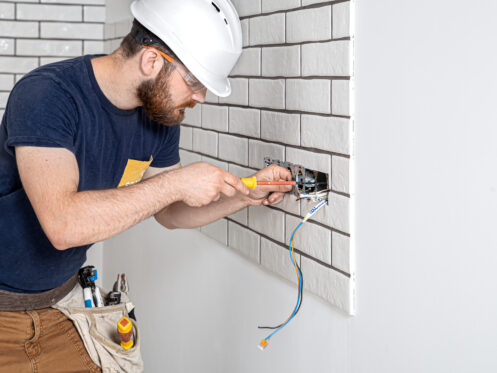While it’s not something that you see every day, your home’s electrical wiring is something that will eventually wear out or become outdated and need replacing, known as rewiring. Rewiring usually includes not only replacing your home’s wiring but also outlets, switches, hardwired fixtures and breaker panel. While homes may experience different lifespans with their wiring, these 11 signs suggest that your home may need rewiring.
1. Lights That Flicker or Dim
You may notice some flickering during strong weather events when there’s extra strain on the power grid. However, you shouldn’t notice any flickering or dimming during normal operation. Any regular flickering or dimming may signal that you’re overtaxing your home’s electrical system or some of the circuits in it, especially when high-draw appliances start up. If you’ve recently switched light bulbs, flickering can also originate from some LED bulbs if the socket is dirty or something is causing voltage fluctuations.
2. Tripping Circuit Breakers
A telltale sign of a wearing electrical system in your home is repeatedly tripping circuit breakers. Breakers shouldn’t trip unless there’s too much power being drawn through the circuit. Repeatedly tripping breakers indicate that it’s time to examine how the circuits are laid out, and possibly the need to add more to handle all of the demands for energy around your home.
3. Outlet or Light Switch Burning Smell
You should pay particular attention any time you get a burning smell around your home. If the odor originates from power outlets or light switches, it’s important to kill power to the circuit at the breaker until the issue is resolved. Electrical issues are one of the leading causes of household fires and usually ignite because of electrical arcing sparking a combustible material such as dirt, dust, or wood studs.
4. Discolored Outlets or Switch Covers
Even if you don’t smell anything burning, you should pay attention to discolored outlet and switch covers. White or cream-colored covers may yellow as they age. However, yellowing can also indicate that they have overheated. Also pay particular attention to any brown or black streaking, which may indicate the outlet or switch has produced smoke at some point. Both of these signs can occur because of damage to wiring insulation, overdrawing a circuit, and excess electrical resistance because of loose connections.
5. You Need Power Strips for Sufficient Outlets
One of the common experiences in older homes is the need for power strips to expand the outlets available for everything modern homes need to plug in. Excessive power strip use can overload not only a circuit but also the outlet it’s plugged into. Rewiring a house is not just about replacing aging wires but also evaluating the circuits and installing new outlets where appropriate.
6. Sparks or Shocks When Plugging In Appliances
Pay particular attention to what happens when you plug something in or unplug it. Some arcing may be normal as the prongs on the plug come close enough to the contacts inside the outlet to allow the electricity to jump across the gap, known as arcing. However, significant arcing may indicate a problem like a short, moisture in the outlet, damaged wiring, an aging outlet or overloading the circuit. Also, pay attention to whether you experience shocks when plugging appliances into an outlet. This can be as simple as excess static charge in the air due to insufficient humidity or may indicate an electrical problem requiring rewiring, especially if it happens at most of your outlets or switches.
7. Outlets Without Grounding Prong
If you live in a home built before 1962, you may have two-pronged outlets that do not include grounding. Some people get adapters that allow them to use three-prong plugs in the two-prong outlets. This is not advisable because of the risks associated with ungrounded circuits. Grounding provides a safe path for excess electricity to flow into the ground if there’s a fault in the circuit. Keeping ungrounded outlets increases the risk of significant shock, electrical fires and power surge damage when there’s an issue within the circuit. If your home has these outlets, it’s time to consider rewiring and replacing all of them with modern outlets.
8. Buzzing or Crackling Sounds Behind Walls
A properly functioning electrical system shouldn’t produce any noise. Buzzing or crackling sounds coming from within the wall indicate a possible short or arcing, posing a serious safety concern. If you hear this, turn off the breaker for the circuit or the main breaker if you hear it in multiple places. Then, call an electrician to troubleshoot the cause and if it’s significant enough to rewire your home.
9. Visible Wire Damage
You should also inspect the wiring behind your outlet and switch covers annually. Look for signs of melted or cracked insulation and exposed or frayed wiring. Additionally, open up your breaker panel and inspect the wires inside for any signs of damage, or have a professional electrician come and inspect it. Keep in mind that checking the wires in the breaker panel requires removing the face of the panel. Visible signs of wire damage may indicate circuit overload, an outdated electrical system or a fault in the system. Rewiring the system may help solve all of these and will update your panel to handle the new load demands.
10. Hot Switch Plates, Cords or Plugs
An electrical system that’s working properly should not create much heat. However, when there’s too much electrical resistance, it will generate heat. Check faceplates, electrical plugs and wires to see if they feel hot. If they do, it may indicate there’s a problem causing excessive resistance. This extra heat can build up and spark a fire if left unattended for too long. Extra resistance can be caused by loose connections, broken wires or simply wires that aren’t rated to conduct the amount of electricity that’s being demanded by the appliances plugged into the system.
11. Loose Outlets
Loose outlets can cause a wide range of symptoms and are a natural part of wearing over time. The symptom you’re most likely to notice is electrical plugs that are loose when you plug them into an outlet and are caused by contacts in the outlet becoming loose. This same problem may also cause arcing, heat, sparking, a burning smell, a tripped circuit breaker or damage to the outlet wiring. When you rewire a home, you typically replace the outlets, switches and breaker panel in addition to the actual wiring.
For the last 40 years, people around Mentor have trusted Anderson Heating, Cooling, Plumbing & Electric for the services needed to keep their homes comfortable and safe. Our expert team provides a wide range of residential electrical services, including rewiring, EV chargers, panel upgrades, whole home surge protection and other electrical repairs and upgrades, heating and air conditioning installation, maintenance and repair and a full range of residential plumbing services, including water heaters, gas lines, water lines, water softeners, sump pumps and garbage disposals. Call to schedule a consultation with one of our screened electricians to explore whether your home needs rewiring.


